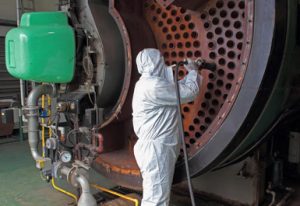Boilers heat water or liquid to turn into either steam or hot water for your building. If a boiler is running, there must be enough fuel to keep it going. A lack of energy will cause the boiler to stop heating up and throwing off cold air until the problem is fixed. Boiler maintenance can include many different things – from changing the pressure control valve, unclogging a condensate trap, and fixing emissions problems to installing new fittings and repairing small leaks in copper tubing that carry away excess heat from inside your furnace unit.

7 Common Boiler Repairs
1. Replacing Pressure Control Valves
A pressure control valve controls the heat output of your boiler. If a valve is not working correctly, you won’t get the proper heat out of your system. This can cause several problems, like undercharged boilers and excess pressure in the system, and it will prevent you from having that excellent, consistent heat all winter long.
2. Replacing Thermostats
If your thermostat has been acting up and not responding to changes in temperature within your building, it is time to replace it with a new one that will work properly once again. Follow the current wiring, and that should show you what elements are connected to what part of the thermostat. You will have to replace it with your boiler’s pressure control valve.
3. Replacing Copper Tubing (Condensate Trap)
If you have had to replace one or more of your copper tubes in the past, it may be time to replace them again, even if they are in good shape. A leaking pipe on a condenser coil will cause the system to lose heat and strain an already stressed part of the system.
4. Replacing the Flame Sensor
Replacing a flame sensor will prevent your boiler from running all of the time when there is no need to run. It will stop your fuel costs from going up, and it will save you on your overall energy bill at the end of each month. A flame sensor makes sure that there is enough heat left for a boiler to run correctly. If there isn’t enough heat remaining, it turns off so that the boiler doesn’t release cold air until enough energy is stored up in the system again.
5. Replacing Boiler Furnace Filters
Replace furnace filters at least yearly. If there is too much dust in the air, it will affect the system’s efficiency by letting off excess heat that won’t be used as intended. There are many different filters, so make sure you have a good idea of what the filter does before you head out to buy one for your furnace. Older furnaces can also use a paper filter, so check with whoever is servicing your furnace to see what type of filter is best for you and replace it accordingly.
6. Replacing your Boiler Furnace Coils
If your furnace is more than one year old, you might have to replace the coils. The ones made today are much different from the old ones because they hold much more heat than they did before.
7. Replacing Boiler Pressure Valves
If you have a pressure relief valve that will not let off some of the steam pressure in the system, then it may be time to replace yours with a new one. A stuck pressure valve could lead to explosions and other problems with operational efficiency.
It is important to have a company like Brothers Mechanical Services provide routine boiler maintenance for your commercial boiler to provide expert advice and oversight to keep your equipment functioning properly.
